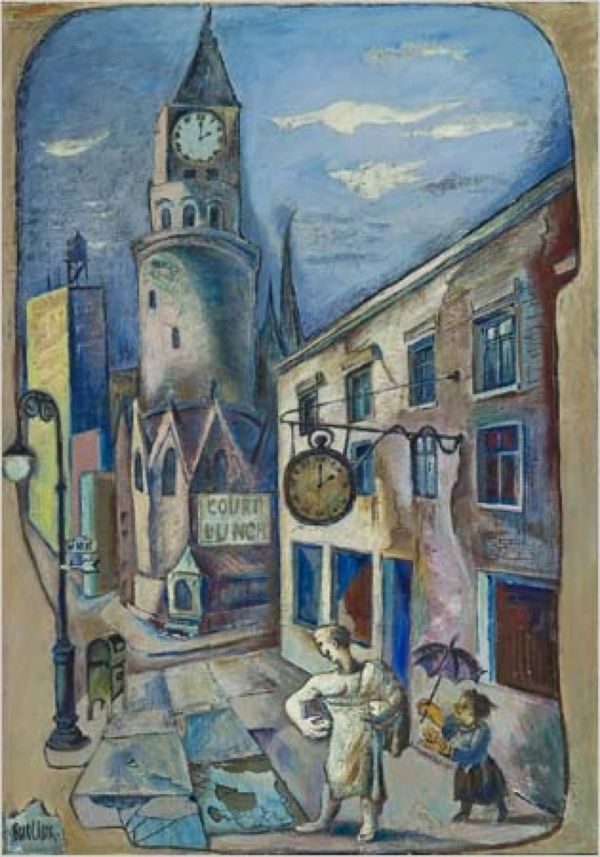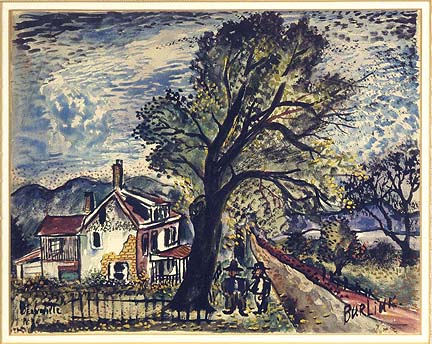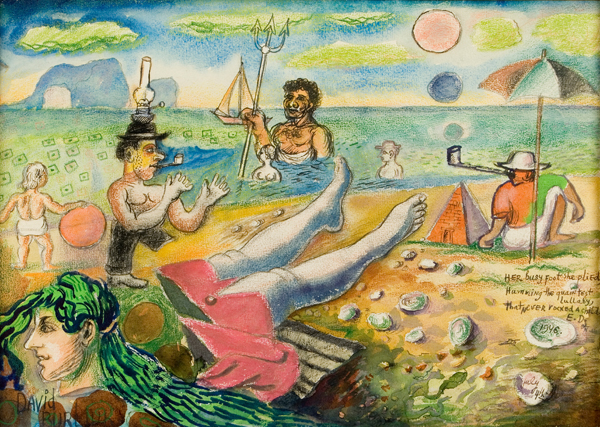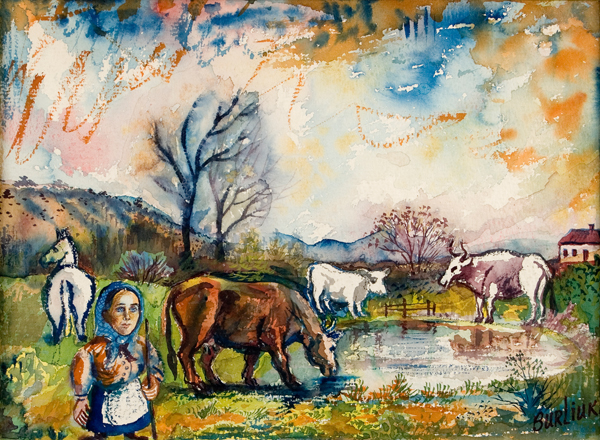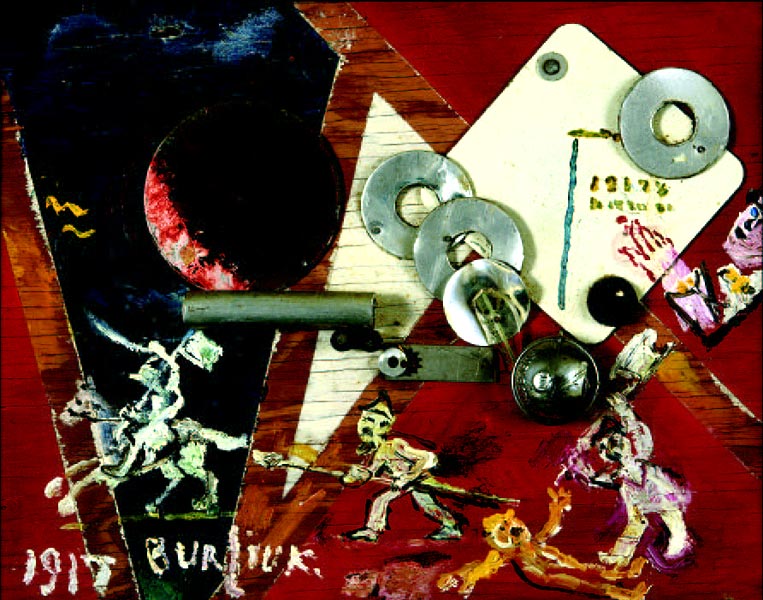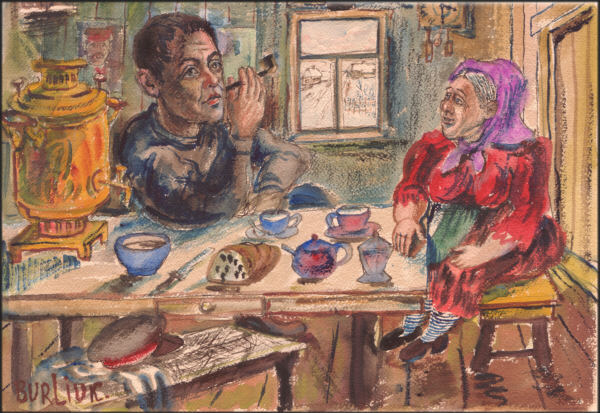<Back to Index>
- Mathematician John Leech, 1926
- Painter David Davidovich Burliuk, 1882
- Tang Emperor of China Gaozong, 628
PAGE SPONSOR
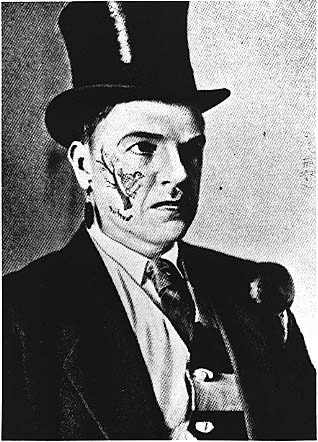

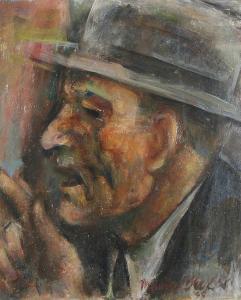
David Davidovich Burliuk (Ukrainian: Давид Давидович Бурлюк; Russian: Давид Давидович Бурлюк) (July 21, 1882 – January 15, 1967) was a Russian avant - garde artist of Ukrainian origin (Futurist, Neo-Primitivist), book illustrator, publicist, and author associated with Russian Futurism. In the words of his publisher Maria (also Maryussia) Burliuk, David Burliuk was the father of "Soviet Russian Futurism."
David Burliuk was born in Semyrotivka near the village of Riabushky (now Lebedyn District, Sumy Oblast) in Ukraine, brother of Volodymyr (Wladimir) Burliuk in a family descended from Ukrainian Cossacks who held premier positions in the Hetmanate. His mother, Ludmila Mikhnevich, was of ethnic Belarussian descent. Because of his given name of "David," Burliuk was frequently mistaken for a Jew.
From 1898 to 1904 he studied at the art schools in Kazan and in Odessa, as well as at the Royal Academy in Munich.
His exuberant, extroverted character was recognized by Anton Azhbe, his
professor at the Munich Academy, who called Burliuk a “wonderful wild
steppe horse.” In 1908 an exhibition with the group Zveno ("The Link") in Kiev was organized by David Burliuk together with Wladimir Baranoff - Rossine, Alexander Bogomazov, Volodymyr (Wladimir) Burliuk and Aleksandra Ekster. From 1910 he was the member of the group Jack of Diamonds. From 1910 to 1911 he attended the Art School in Odessa. After 1911 David concetrated on poetry. From 1911 to 1913 he studied at the Moscow School of Painting, Sculpture and Architecture (MUZHZV). In 1911 Burliuk participated in the group exhibition of the Blaue Reiter in Munich, which also included his brother Wladimir. In 1912 David Burliuk was co-author of the Russian Futurist manifesto A Slap in the Face of Public Taste. In 1913 he was expelled from the Academy. In the same year D. Burliuk founded the publishing venture of the futuristic writer's group Hylaea. In 1915 David Burliuk published the book The Support of the Muses in Spring, with illustrations by Lentulov, and by David and Wladimir Burliuk. From 1915 to 1917 he resided in the Urals with frequent trips to Moscow and Petrograd (St. Petersburg). In 1917 he participated in an exhibition with the group Jack of Diamonds in the artists' salon in Moscow, which included Aleksandra Ekster and Kazimir Malevich. From 1918 to 1922 he travelled to the USA via Siberia, Japan, and Canada. In 1925 Burliuk was a co-founder of the Association of Revolutionary Masters of Ukraine (ARMU) with Alexander Bogomazov, Vasiliy Yermilov, Vadym Meller, Alexander Khvostenko - Khvostov, and Palmov Victor. In
1927 he participated in an exhibition of the Latest Artistic Trends in
the Russian Museum in Leningrad (St. Petersburg), together with Kazimir Malevich, Aleksandr Shevchenko, and Vladimir Tatlin. David Burliuk was author of autobiographical sketches My Ancestors, Forty Years: 1890 – 1930. In 1909 Burliuk painted a portrait of his future wife, Marussia, on a background of flowers and rocks on the Crimean coast.
Many times thereafter he would set the image of his wife to canvas.
Without question two dreams possessed his heart all his life: the face of his wife and the portrait of his homeland - first Ukraine and then his adopted country, the United States. In 1945 an exhibit was mounted at Irving Place Theater in New York City. In
1962 he and his wife travelled to Australia where he held an exhibition
at Moreton Galleries, Brisbane. It was his only Australian exhibition.
During his stay there David Burliuk painted some sketches and works
with Australian views. From 1937 to 1966 Burliuk and his wife, Marussia, published Color & Rhyme, a periodical primarily concerned with charting Burliuk's activities. In
1940, Burliuk petitioned the Soviet government for a request to visit
his homeland. In exchange, he offered a sizeable collection of archival
material pertaining to his contemporary and friend Vladimir Mayakovsky,
which Burliuk offered to donate to the Mayakovsky Museum in addition to
over 100 original paintings. Burliuk's requests were denied. He was
allowed to visit the Soviet Union only in 1956 and 1965. David Burliuk died on Long Island, New York.
In
Russian poetry, Burliuk is regarded as a trailblazer. In 1990, the
Russian Academy of Futurist Poetry established the David Burliuk Prize
(Otmetina) for experimental poetry awarded annually.
